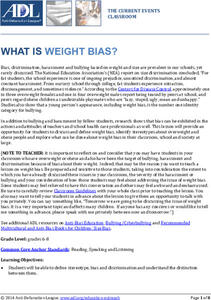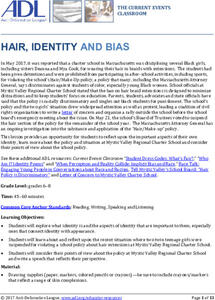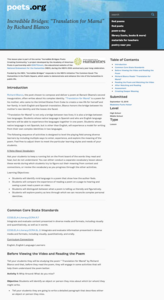Learning for Justice
Cliques in Schools
Band geeks, jocks, preppies; every school has its groups. Middle and high schoolers identify the various friendship groups and cliques in their school and consider these groups' positive and negative traits. After completing a Clique...
Anti-Defamation League
What Is Weight Bias?
After setting rules and expectations to create a safe place to share thoughts and feelings, scholars define the terms; stereotype, basis, and discrimination. Using a web brainstorm, learners list words associated with overweight and...
Learning for Justice
Looking Closely at Ourselves
A thoughtful discussion about self-reflecting leads to a conversation about skin color and making a list of words associated with "beauty." Budding artists use a mirror to examine their features and create a self-portrait. Peers critique...
Anti-Defamation League
Don't Let Hate Ruin the Fun: Youth and Online Games
Gamers unite! Take action against bullying and hate speech in online video games! After reading data that reveals the extent to which various age groups experience hate and, or harassment while playing video games online, groups develop...
Anti-Defamation League
Hair, Identity and Bias
Middle schoolers weigh in on dress codes, specifically those that apply to hair and make-up, with a lesson plan that uses a 2017 case from a charter school in Massachusetts. Class members read about two girls suspended for violating the...
Anti-Defamation League
Hair Discrimination and the CROWN Act
The CROWN Act (Creating a Respectful and Open World for Natural Hair) is the subject of the lesson that asks groups to research the stories of five different women and share their insights in a jigsaw activity. Participants then craft...
Anti-Defamation League
Teens, Tech, Connect: How Technology Impacts Teenagers' Friendships
To understand their time spent online, class members chart their use of technology during early morning hours, during school, after school, in the evenings, and on weekends. They then read several reports about how social media...
Curated OER
Vocabulary Instructional Routine: Identify and Sort Common Objects into Categories
Kindergarteners build vocabulary by learning about categorization. They discuss the attributes of living and non-living things. As a class, they view and sort pictures into each category. They discuss the word category and what it means.
Learning for Justice
Recognizing Discrimination
Empower scholars to take a peaceful stand against discrimination. The color of their clothes separates learners; then, only some are allowed to go to recess—this sparks a discussion about the concept of discrimination and how they felt...
Anti-Defamation League
Building a Foundation for Safe and Kind Online Communication
Put a spotlight on internet safety with a lesson designed to boost positive online communication. Scholars listen to the story, Yettele's Feathers by Joan Rothenberg, and answer questions. An emoji-themed handout challenges pupils to...
Anti-Defamation League
Nothing Wrong with a Three-Legged Dog: Discussion Guide for Grades 3-5
Scholars study the book, Nothing Wrong with a Three-Legged Dog by Graham McNamee to encourage an antibullying trend in their school and community. Chapters and themes examine bias, coping skills, how to respond to bullying, and being a...
Anti-Defamation League
Say Something: Discussion Guide for Grades 2-4
Empower pupils to stop bullying when they see or experience it with a lesson that showcases the book, Say Something by Margaret Paula Moss. After reading the tale and thoughtfully discussing its characters, they share their own...
Anti-Defamation League
The Name Jar: Discussion Guide for Grades Pre-K–1
A activity spotlights the story, The Name Jar, by Yangsook Choi. After a read-aloud, the class retells the story using puppets or dress-up. They participate in a thoughtful discussion about the story, answer questions relating the book...
Learning for Justice
What is Empathy?
Young scholars examine facial expressions to identify emotions, listen carefully to stories, and choose the appropriate reaction. Partners choose one story to rewrite, showing empathy for others.
Curated OER
Day of the Dead (Dia de los Muertos) - A Cultural Holiday: Color Exploration of Warm and Cool Colors
Young artists examine pictures from and discuss the holiday Día de los Muertos. The symbolic skull showcases the use of warm and cool colors. Color exploration allows learners to use coordinating colors to create two paper...
Curated OER
Mexican Folk Art: Sugar Skulls
Scholars use their knowledge of color to create vibrant skulls for Día de los Muertos. A thoughtful discussion brings forth information about the special holiday. A review of cool colors and warm colors prepares learners for the creation...
Academy of American Poets
Teach This Poem: "Tamales on Christmas" by Christian Robinson
A lesson spotlights the poem "Tamales on Christmas" by Christian Robinson. Scholars discuss their favorite foods and then examine a lively picture of a family preparing tamales. After listening to the poem twice, learners participate in...
Teaching for Change
Latino/Hispanic Heritage Resource Packet
Here's a must-have resource for Latino/Hispanic heritage month, September 15 through October 15. The 18-page packet includes suggestions to guide your planning, quizzes to test knowledge of heritage facts and immigration myths, and...
Academy of American Poets
On "El Florida Room" by Richard Blanco
Scholars of all ages examine Richard Blanco's poem, "El Florida Room." Looking closely at pictures, pupils look for details that stand out to them, then read the poem. A whole-class discussion allows learners to reflect on what they...
Academy of American Poets
Teach This Poem: "When Giving Is All We Have" by Alberto Ríos
What makes giving meaningful? Class members discuss this question, then listen to Alberto Rios reading his poem, "When Giving Is All We Have." Finally, the class considers what the poet says about the question.
Academy of American Poets
Incredible Bridges: “Translation for Mamá” by Richard Blanco
Who or what do you miss? That's the question that launches an activity that asks writers to craft a paragraph filled with sensory details that shows how they feel. Next, they listen to Richard Blanco reading his poem, "Translation for...
Academy of American Poets
Teach This Poem: "When There Were Ghosts" by Alberto Ríos
Before cell phones, tablets, and computers with access to YouTube, before gleaming multiplexes and even before television, there were small theaters with Saturday night black and white movies. Alberto Ríos's poem "When There Were Ghosts"...
Anti-Defamation League
Who Was César Chávez?
Scholars complete a KWL chart to indicate what they know about Cesar Chavez and then research what they want to know about this farm worker, labor leader, and civil rights activist. To complete the lesson, scholars research modern civil...
National Endowment for the Humanities
"Sí, se puede!": Chávez, Huerta, and the UFW
"Sí, se puede!" Cesar Chavez and Dolores Huerta believed organizing farm workers and changing their working conditions were possible. Scholars examine provisions of the Bracero Program, videos, and the United Farm Workers' (UFW) work....

























